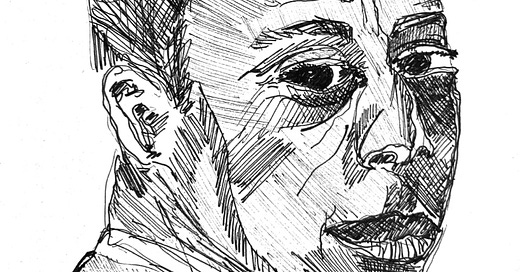This week I’m reading James Baldwin’s Another Country (1960) for school. I’ve never read it before. Baldwin is teaching me how to read all over again. My annotations hardly make sense because almost every line is underlined or starred.
Baldwin gives us competing visions of the writer and the writer’s life, but his passages about writing seem so unselfconscious that the reader might forget they were written by a novelist. He accomplishes in his writing about writing what his characters are struggling to do in their writing. There’s Richard, who is coming up against the limitations of talent, his success feeling like a pernicious form of failure. And there’s Vivaldo, who is standing on the precipice of telling the truth, waiting for something (or someone) to tip him over the edge.
The differences between these two men as novelists—that is, observers of people, real and imagined—plays out in a single masterful scene. Vivaldo enters his friends’ apartment somehow knowing the terrible news he’d receive days later, that his best friend Rufus has hurled himself off the George Washington Bridge. “He examined his fingernails,” Baldwin writes. “They were jagged and in mourning.” The description of his fingernails is a transferred epithet—transitively, by enallage, his nails share the same properties that he possesses. He is rough around the edges, subconsciously in mourning for Rufus. Richard, on the other hand, not too bothered by Rufus’ sister’s frantic call, begins tending to his nails just as she is about to arrive. As the sister arrives, “Richard rose from the hassock; he had been clipping his nails.” He’s good-natured, we learn over the course of the novel, but (as his casual nail-clipping suggests) he is oblivious—to Rufus’ sister’s distress, his wife’s thinly-veiled anxiety, Vivaldo’s grave temperament. For a novelist, he is markedly unperceptive.
Richard’s obtuseness is precisely what his perceptive wife Cass is forced to confront as his popular novel begins to attract attention. As Cass listens to Vivaldo recount horrific scenes from his youth, but blankly, almost like an automaton, she realizes that Vivaldo has not yet “expressed” what would free him from his past. She thinks about the writer’s encounter with darkness and instability which Vivaldo, not Richard, is preparing to make:
“Perhaps such secrets, the secrets of everyone, were only expressed when the person laboriously dragged them into the light of the world, imposed them on the world, and made them a part of the world’s experience. Without this effort, the secret place was merely a dungeon in which the person perished; without this effort, indeed, the entire world would be an uninhabitable darkness; and she saw, with a dreadful reluctance, why this effort was so rare. Reluctantly, because she then realized that Richard had bitterly disappointed her by writing a book in which he did not believe. In that moment she knew, and she knew that Richard would never face it, that the book he had written to make money represented the absolute limit of his talent. It had not really been written to make money—if only it had been! It has been written because he was afraid, afraid of things dark, strange, difficult, and deep.”
The rhythmic regurgitation of words and phrases throughout this passage gird its message: all the repetition (needless to the point of pleonasm) mimics Cass’ internal struggle with this thought, which in turn echoes the writer’s struggle, “this effort” to bring secrets into the light of the world. Right here in the language is the effort of writing—which does not come passively pouring out but which has to be dragged out.
While Vivaldo “did not seem to know enough about the people in his novel,” he nevertheless feels his characters writhing about inside him, “without, for all their ugly intransigence, showing the faintest desire to leave him.” Like Cass, who believes in his capacities as a writer, Vivaldo’s characters “were waiting for him to find the key, press the nerve, tell the truth.” What evidence do we have of Vivaldo being a writer superior to Richard? Only that he has not yet given up on writing the book in which he believes. Through competing visions of the writing life, Baldwin gives us some directions for reading. Which of the two men are characterized as more observant witnesses to the peculiarities of the people around them? The narrator never ventures into Richard’s point of view—because, as Cass realizes to her dismay, Richard is too afraid to make the dangerous descent into the dungeon. As a writer, Vivaldo is closer to the narrator, closer to us.
Another Country is the kind of book that makes you want to stay up until two-o’clock in the morning reading it and writing about it—which I’ve done the past several nights. It’s an assignment, but it doesn’t feel like one at all.





